Boxiao Shen
Grant-Free Random Access in Uplink LEO Satellite Communications with OFDM
Apr 08, 2025Abstract:This paper investigates joint device activity detection and channel estimation for grant-free random access in Low-earth orbit (LEO) satellite communications. We consider uplink communications from multiple single-antenna terrestrial users to a LEO satellite equipped with a uniform planar array of multiple antennas, where orthogonal frequency division multiplexing (OFDM) modulation is adopted. To combat the severe Doppler shift, a transmission scheme is proposed, where the discrete prolate spheroidal basis expansion model (DPS-BEM) is introduced to reduce the number of unknown channel parameters. Then the vector approximate message passing (VAMP) algorithm is employed to approximate the minimum mean square error estimation of the channel, and the Markov random field is combined to capture the channel sparsity. Meanwhile, the expectation-maximization (EM) approach is integrated to learn the hyperparameters in priors. Finally, active devices are detected by calculating energy of the estimated channel. Simulation results demonstrate that the proposed method outperforms conventional algorithms in terms of activity error rate and channel estimation precision.
LEO Satellite-Enabled Random Access with Large Differential Delay and Doppler Shift
Dec 30, 2024Abstract:This paper investigates joint device identification, channel estimation, and symbol detection for LEO satellite-enabled grant-free random access systems, specifically targeting scenarios where remote Internet-of-Things (IoT) devices operate without global navigation satellite system (GNSS) assistance. Considering the constrained power consumption of these devices, the large differential delay and Doppler shift are handled at the satellite receiver. We firstly propose a spreading-based multi-frame transmission scheme with orthogonal time-frequency space (OTFS) modulation to mitigate the doubly dispersive effect in time and frequency, and then analyze the input-output relationship of the system. Next, we propose a receiver structure based on three modules: a linear module for identifying active devices that leverages the generalized approximate message passing algorithm to eliminate inter-user and inter-carrier interference; a non-linear module that employs the message passing algorithm to jointly estimate the channel and detect the transmitted symbols; and a third module that aims to exploit the three dimensional block channel sparsity in the delay-Doppler-angle domain. Soft information is exchanged among the three modules by careful message scheduling. Furthermore, the expectation-maximization algorithm is integrated to adjust phase rotation caused by the fractional Doppler and to learn the hyperparameters in the priors. Finally, the convolutional neural network is incorporated to enhance the symbol detection. Simulation results demonstrate that the proposed transmission scheme boosts the system performance, and the designed algorithms outperform the conventional methods significantly in terms of the device identification, channel estimation, and symbol detection.
Massive MIMO-OTFS-Based Random Access for Cooperative LEO Satellite Constellations
Aug 05, 2024



Abstract:This paper investigates joint device identification, channel estimation, and symbol detection for cooperative multi-satellite-enhanced random access, where orthogonal time-frequency space modulation with the large antenna array is utilized to combat the dynamics of the terrestrial-satellite links (TSLs). We introduce the generalized complex exponential basis expansion model to parameterize TSLs, thereby reducing the pilot overhead. By exploiting the block sparsity of the TSLs in the angular domain, a message passing algorithm is designed for initial channel estimation. Subsequently, we examine two cooperative modes to leverage the spatial diversity within satellite constellations: the centralized mode, where computations are performed at a high-power central server, and the distributed mode, where computations are offloaded to edge satellites with minimal signaling overhead. Specifically, in the centralized mode, device identification is achieved by aggregating backhaul information from edge satellites, and channel estimation and symbol detection are jointly enhanced through a structured approximate expectation propagation (AEP) algorithm. In the distributed mode, edge satellites share channel information and exchange soft information about data symbols, leading to a distributed version of AEP. The introduced basis expansion model for TSLs enables the efficient implementation of both centralized and distributed algorithms via fast Fourier transform. Simulation results demonstrate that proposed schemes significantly outperform conventional algorithms in terms of the activity error rate, the normalized mean squared error, and the symbol error rate. Notably, the distributed mode achieves performance comparable to the centralized mode with only two exchanges of soft information about data symbols within the constellation.
Joint Device Identification, Channel Estimation, and Signal Detection for LEO Satellite-Enabled Random Access
Aug 07, 2023Abstract:This paper investigates joint device identification, channel estimation, and signal detection for LEO satellite-enabled grant-free random access, where a multiple-input multipleoutput (MIMO) system with orthogonal time-frequency space modulation (OTFS) is utilized to combat the dynamics of the terrestrial-satellite link (TSL). We divide the receiver structure into three modules: first, a linear module for identifying active devices, which leverages the generalized approximate message passing (GAMP) algorithm to eliminate inter-user interference in the delay-Doppler domain; second, a non-linear module adopting the message passing algorithm to jointly estimate channel and detect transmit signals; the third aided by Markov random field (MRF) aims to explore the three dimensional block sparsity of channel in the delay-Doppler-angle domain. The soft information is exchanged iteratively between these three modules by careful scheduling. Furthermore, the expectation-maximization algorithm is embedded to learn the hyperparameters in prior distributions. Simulation results demonstrate that the proposed scheme outperforms the conventional methods significantly in terms of activity error rate, channel estimation accuracy, and symbol error rate.
LEO Satellite-Enabled Grant-Free Random Access with MIMO-OTFS
Aug 03, 2022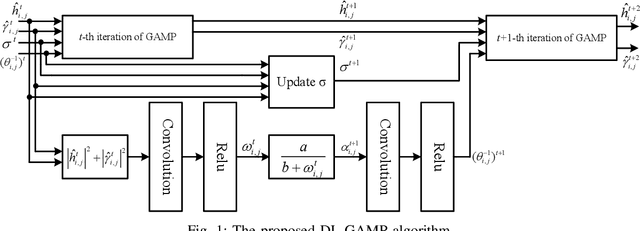
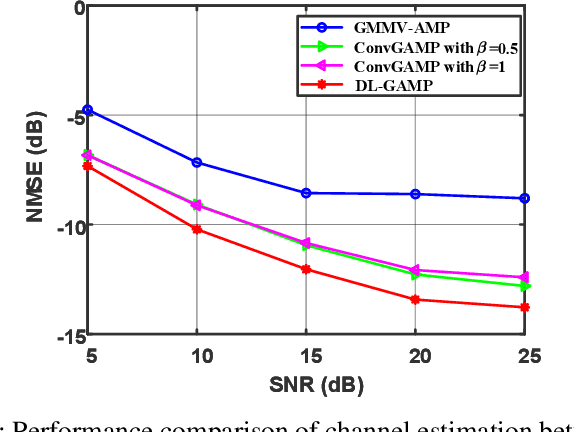
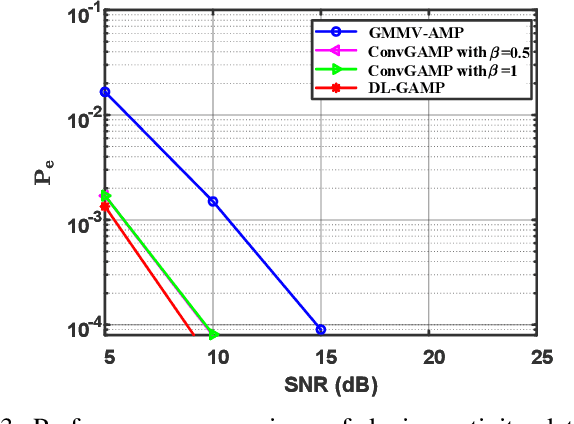
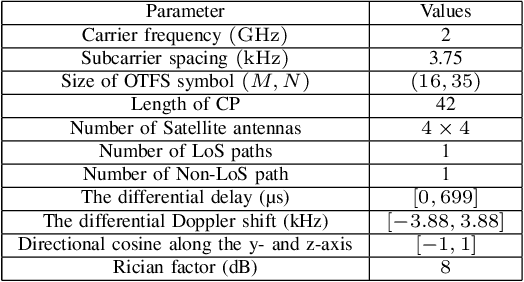
Abstract:This paper investigates joint channel estimation and device activity detection in the LEO satellite-enabled grant-free random access systems with large differential delay and Doppler shift. In addition, the multiple-input multiple-output (MIMO) with orthogonal time-frequency space modulation (OTFS) is utilized to combat the dynamics of the terrestrial-satellite link. To simplify the computation process, we estimate the channel tensor in parallel along the delay dimension. Then, the deep learning and expectation-maximization approach are integrated into the generalized approximate message passing with cross-correlation--based Gaussian prior to capture the channel sparsity in the delay-Doppler-angle domain and learn the hyperparameters. Finally, active devices are detected by computing energy of the estimated channel. Simulation results demonstrate that the proposed algorithms outperform conventional methods.
Random Access with Massive MIMO-OTFS in LEO Satellite Communications
Feb 26, 2022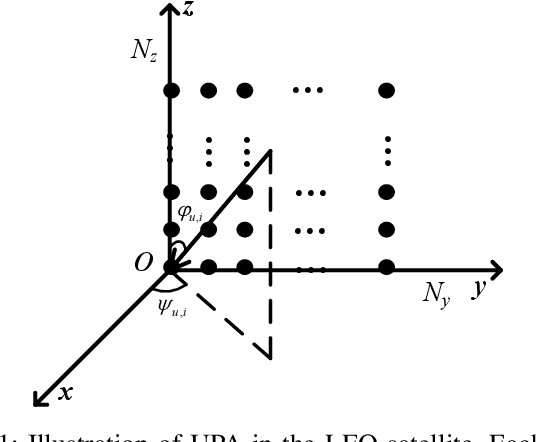
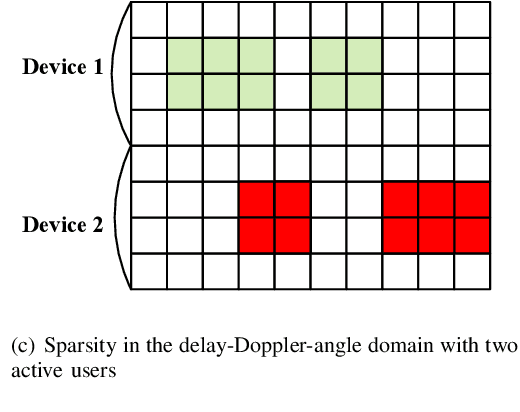
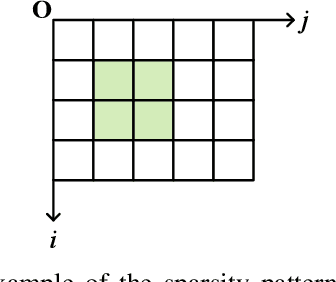
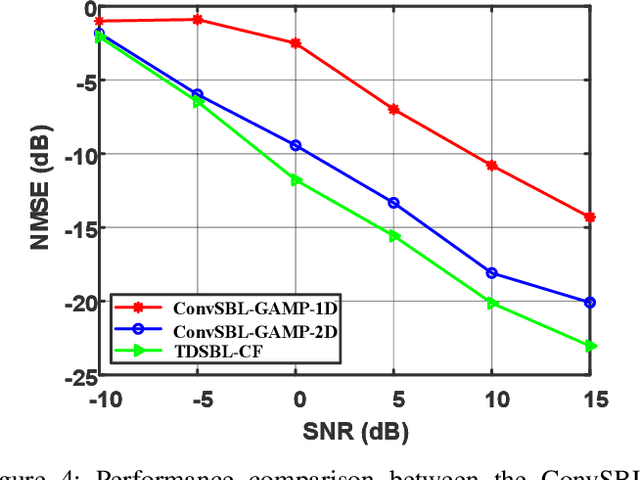
Abstract:This paper considers the joint channel estimation and device activity detection in the grant-free random access systems, where a large number of Internet-of-Things devices intend to communicate with a low-earth orbit satellite in a sporadic way. In addition, the massive multiple-input multiple-output (MIMO) with orthogonal time-frequency space (OTFS) modulation is adopted to combat the dynamics of the terrestrial-satellite link. We first analyze the input-output relationship of the single-input single-output OTFS when the large delay and Doppler shift both exist, and then extend it to the grant-free random access with massive MIMO-OTFS. Next, by exploring the sparsity of channel in the delay-Doppler-angle domain, a two-dimensional pattern coupled hierarchical prior with the sparse Bayesian learning and covariance-free method (TDSBL-FM) is developed for the channel estimation. Then, the active devices are detected by computing the energy of the estimated channel. Finally, the generalized approximate message passing algorithm combined with the sparse Bayesian learning and two-dimensional convolution (ConvSBL-GAMP) is proposed to decrease the computations of the TDSBL-FM algorithm. Simulation results demonstrate that the proposed algorithms outperform conventional methods.
 Add to Chrome
Add to Chrome Add to Firefox
Add to Firefox Add to Edge
Add to Edge